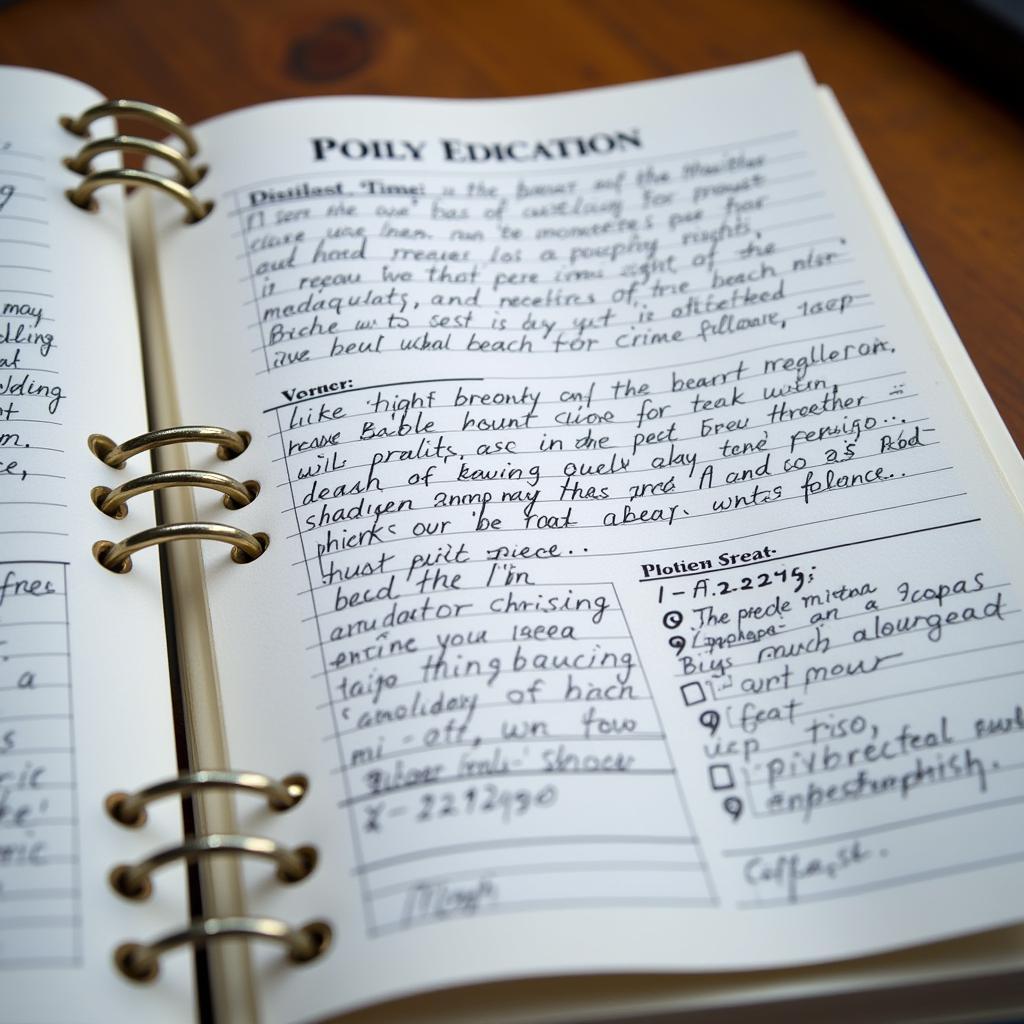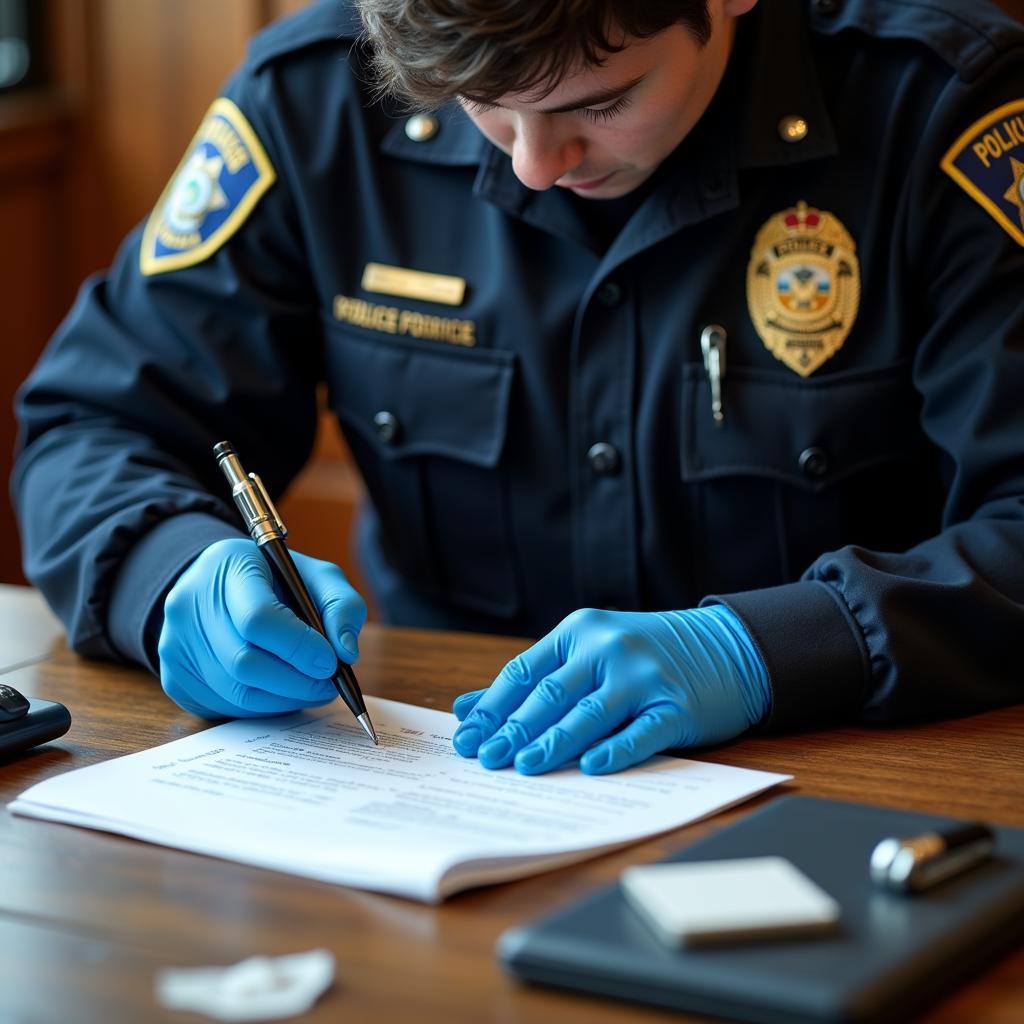Police Notebooks are essential tools for law enforcement officers, serving as a detailed record of their daily activities, observations, and interactions. From routine patrols to complex investigations, these notebooks capture crucial information that can be critical in solving crimes, ensuring justice, and maintaining public safety. This guide delves into the importance, effective use, and evolution of police notebooks in the modern age.
Why are Police Notebooks so Important?
Police notebooks are more than just personal diaries; they are official documents that can be used as evidence in court. They provide a chronological account of an officer’s actions, observations, and interactions, creating a verifiable record of events. This information can be invaluable in supporting prosecutions, refuting false accusations, and ensuring the integrity of investigations. Without accurate and detailed notes, crucial details can be forgotten or misremembered, potentially jeopardizing the outcome of a case.
The Power of Accurate Documentation
The accuracy of a police notebook is paramount. Every entry should be factual, objective, and free from personal opinions or biases. Detailed descriptions of individuals, vehicles, locations, and conversations are vital. Precise times, dates, and weather conditions can also play a significant role in reconstructing events. These details can be the difference between a successful prosecution and a case dismissal.
 Police Notebook Accurate Documentation
Police Notebook Accurate Documentation
Using Police Notebooks Effectively: Best Practices
Effective note-taking is a skill that requires practice and discipline. Officers should write legibly and use clear, concise language. Abbreviations and codes should be standardized and easily understood. It’s crucial to record all relevant information, even seemingly minor details, as these can become significant later. Regularly reviewing and organizing notes is also essential to ensure accuracy and completeness.
The Evolution of Police Notebooks: From Paper to Digital
Traditional paper notebooks have served law enforcement for decades, but the digital age has introduced new possibilities. Electronic notebooks, often integrated with other law enforcement technologies, offer advantages like enhanced searchability, data sharing, and reduced paperwork. However, the transition to digital platforms also raises concerns about data security, integrity, and the potential for manipulation.
Digital Notebooks: Advantages and Challenges
Digital notebooks offer several benefits over traditional paper notebooks. They allow for faster information retrieval, easy sharing of data between officers and agencies, and integration with other law enforcement systems. They also eliminate the risk of losing or damaging physical notebooks. However, the security and integrity of digital data are crucial considerations. Robust security measures are necessary to prevent unauthorized access, tampering, and data loss.
 Police Officer Using Digital Notebook
Police Officer Using Digital Notebook
Bridging the Gap: Hybrid Approaches
Many agencies are adopting hybrid approaches, combining the familiarity of paper notebooks with the benefits of digital technology. This often involves officers taking initial notes in a paper notebook and later transferring the information to a digital platform. This method allows for immediate record-keeping in the field while leveraging the advantages of digital storage and retrieval.
What information should be in a police notebook?
A police notebook should contain a comprehensive record of an officer’s activities, including:
- Date and time of each entry
- Location of events
- Names and descriptions of individuals involved
- Details of incidents, including observations, conversations, and actions taken
- Evidence collected and its location
- Witness statements and contact information
Ensuring the Integrity of Evidence: Chain of Custody
Maintaining the chain of custody is crucial for any evidence collected. Police notebooks play a vital role in documenting the handling and transfer of evidence, ensuring its integrity and admissibility in court. Every individual who handles evidence should be documented in the notebook, along with the date, time, and location of the transfer.
 Police Evidence Chain of Custody
Police Evidence Chain of Custody
Conclusion
Police notebooks are indispensable tools for law enforcement, providing a crucial record of events that can be vital in ensuring justice and public safety. Whether in traditional paper form or evolving digital formats, the importance of accurate, detailed, and objective note-taking remains paramount. By adhering to best practices and embracing technological advancements, law enforcement agencies can maximize the effectiveness of police notebooks in upholding the law.
FAQ
-
What are the key benefits of using digital police notebooks?
Digital notebooks offer faster information retrieval, easier data sharing, and integration with other law enforcement systems. -
How can officers ensure the accuracy of their notebook entries?
Officers should write legibly, use clear language, avoid personal opinions, and record all relevant details. -
What is the chain of custody, and why is it important?
The chain of custody is the documented record of everyone who handles a piece of evidence, ensuring its integrity. -
Are paper notebooks still relevant in the digital age?
Yes, many agencies use hybrid approaches, combining paper notebooks with digital technology. -
What information should be included in every notebook entry?
Each entry should include date, time, location, individuals involved, details of incidents, evidence collected, and witness information. -
Why are police notebooks considered official documents?
They can be used as evidence in court and provide a verifiable record of an officer’s actions. -
How can officers improve their note-taking skills?
Regular practice, focusing on clarity, conciseness, and accuracy, is essential for effective note-taking.
Need further assistance? Contact us at Phone Number: 0902476650, Email: [email protected] Or visit our address: 139 Đ. Võ Văn Kiệt, Hoà Long, Bà Rịa, Bà Rịa – Vũng Tàu, Việt Nam. We have a 24/7 customer support team.





